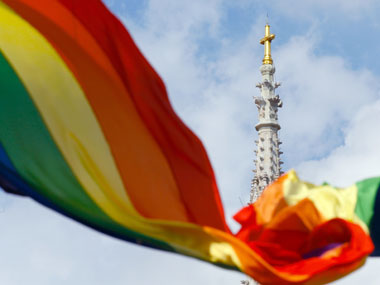A day after Union Health Minister Ghulam Nabi Azad termed homosexuality as a ‘disease’ and referred to men having sex with men as an ‘unnatural’ Western phenomenon, he clarified that he was misquoted by the media and his comments didn’t refer to homosexuality but only HIV. “I would like to clarify that it’s not my intention to hurt any section of society. I’ve been totally misquoted by a section of the media,” Azad said on Tuesday, adding that “Three things were put into my mouth. I spoke in both Hindi and English. I didn’t use the words homosexuality or gay even once.” However, soon after Azad’s comments, the UNAIDS entered damage control mode and emphasised that homosexuality was not a disease and that there was no place for discrimination based on a person’s sexual orientation. “India’s rich tradition of inclusivity and social justice must include MSM and transgenders,” said Michel Sidibé, executive director, UNAIDS. “There is no place for stigma and discrimination on the basis of sexual orientation. Consistent with WHO’s disease classification, UNAIDS does not regard homosexuality as a disease.” [caption id=“attachment_36808” align=“alignleft” width=“380” caption=“The UN had passed a resolution that the LGBT community has equal rights in the society and cannot be discriminated. Reuters.”]  [/caption] Speaking at the National Convention of Parliamentarians on HIV/AIDS on Monday, Azad had said, “The disease of MSM is unnatural and not good for India. We are not able to identify where it is happening as it is less reported.” Another official associated with the United Nations said, “We are trying to come up with some damage control measures as his reactions is bound to undo the efforts we have put in to spread information to fight against discrimination.” The UN Human Rights Council passed the human rights , sexual orientation and gender identity resolution on 17 June , 2011 that called for an end to sexuality discrimination worldwide and to recognise it as a priority for the UN. Azad’s comments have sparked an outrage among rights activists and the gay community. Protests were also held on the steps of the Town Hall in Bangalore against Azad’s remarks with several activists carrying the multi-colour rainbow flag which symbolises the gay culture. Some activists said Azad’s assessment was “unscientific and irrational” and stressed the need for a change in the community mindset. There was particular anger that the minister’s comments were made at a meeting of officials tasked with promoting and enforcing HIV/AIDS prevention policy at a grassroots level, and that too in the presence of Prime Minister Manmohan Singh and Congress president Sonia Gandhi. “I would say that he was thinking of his constituency while he was airing his narrow comments,” said Anjali Gopalan who heads the NAZ Foundation, a rights group that promotes equal rights for homosexuals and works with HIV positive people. Ashok Row Kavi, a gay rights activist, said, “It is pretty bad but we can’t do anything to change people’s mentality.” On 2 July, 2009, the Delhi High Court struck down provisions of Section 377 of the Indian Penal Code which criminalises gay sex among consenting adults, saying it violated the fundamental rights guaranteed in the Constitution. PTI
Ghulam’s remarks on homosexuality have sparked an outrage among the gay community and human rights activists.
Advertisement
End of Article
Written by FP Archives
see more


)
)
)
)
)
)
)
)
)



